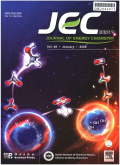- 钛学术文献服务平台 \
- 学术期刊 \
- 工业技术期刊 \
- 石油与天然气工业期刊 \
- 能源化学期刊 \
High-performance polymer electrolyte membranes incorporated with 2D silica nanosheets in high-temperature proton exchange membrane fuel cells
High-performance polymer electrolyte membranes incorporated with 2D silica nanosheets in high-temperature proton exchange membrane fuel cells
基本信息来源于合作网站,原文需代理用户跳转至来源网站获取
摘要:
Silica nanosheets (SN) derived from natural vermiculite (Verm) were successfully incorporated into polyethersulfone-polyvinylpyrrolidone (PES-PVP) polymer to fabricate high-temperature proton exchange membranes (HT-PEMs).The content of SN filler was varied (0.1-0.75 wt%) to study its influ-ence on proton conductivity,power density and durability.Benefiting from the hydroxyl groups of SN that enable the formation of additional proton-transferring pathways,the inorganic-organic membrane displayed enhanced proton conductivity of 48.2 mS/cm and power density of 495 mW/cm2 at 150 ℃without humidification when the content of SN is 0.25 wt%.Furthermore,exfoliated SN (E-SN) and sul-fonated SN (S-SN),which were fabricated by a liquid-phase exfoliation method and silane condensation,respectively,were embedded in PES-PVP polymer matrix by a simple blending method.Due to the sig-nificant contribution from sulfonic groups in S-SN,the membrane with 0.25 wt% S-SN reached the high-est proton conductivity of 51.5 mS/cm and peak power density of 546 mW/cm2 at 150 ℃,48% higher than the pristine PES-PVP membranes.Compared to unaltered PES-PVP membrane,SN added hybrid compos-ite membrane demonstrated excellent durability for the fuel cell at 150 ℃.Using a facile method to pre-pare 2D SN from natural clay minerals,the strategy of exfoliation and functionalization of SN can be potentially used in the production of HT-PEMs.

推荐文章
Thermodynamic properties of San Carlos olivine at high temperature and high pressure
San Carlos olivine
Thermodynamic property
Thermal expansion
Heat capacity
Temperature gradient
Rapid and sensitive method for determining free amino acids in plant tissue by high-performance liqu
HPLC
OPA
FMOC
Free amino acids
Plant
PLS-DA
An experimental study of interaction between pure water and alkaline feldspar at high temperatures a
Alkaline feldspar
Autoclave
High-temperature and high-pressure experiments
内容分析
关键词云
关键词热度
相关文献总数
(/次)
(/年)
引文网络
引文网络
二级参考文献 (0)
共引文献 (0)
参考文献 (0)
节点文献
引证文献 (0)
同被引文献 (0)
二级引证文献 (0)
2022(0)
- 参考文献(0)
- 二级参考文献(0)
- 引证文献(0)
- 二级引证文献(0)
引文网络交叉学科
相关学者/机构
期刊影响力
能源化学
主办单位:
中国科学院大连化学物理研究所
中国科学院成都有机化学研究所
出版周期:
双月刊
ISSN:
2095-4956
CN:
10-1287/O6
开本:
出版地:
大连市中山路457号
邮发代号:
创刊时间:
语种:
eng
出版文献量(篇)
2804
总下载数(次)
0
总被引数(次)
7996
期刊文献
相关文献
推荐文献
- 期刊分类
- 期刊(年)
- 期刊(期)
- 期刊推荐
一般工业技术
交通运输
军事科技
冶金工业
动力工程
化学工业
原子能技术
大学学报
建筑科学
无线电电子学与电信技术
机械与仪表工业
水利工程
环境科学与安全科学
电工技术
石油与天然气工业
矿业工程
自动化技术与计算机技术
航空航天
轻工业与手工业
金属学与金属工艺
能源化学2022
能源化学2021
能源化学2020
能源化学2019
能源化学2018
能源化学2017
能源化学2016
能源化学2015
能源化学2014
能源化学2013
能源化学2012
能源化学2011
能源化学2010
能源化学2009
能源化学2008
能源化学2007
能源化学2006
能源化学2005
能源化学2004
能源化学2003
能源化学2002
能源化学2001

 免费查重
免费查重










